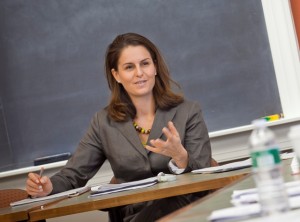
Rebekah Pite, assistant professor of history
It’s all connected for Rebekah Pite. Her honors thesis at Amherst College fostered an appreciation for historical research. A move to Barcelona to teach English to Bayer Pharmaceutical employees awakened a love of teaching. And work in food and nutrition public relations catered to her interest in food.
So, it’s no surprise that when she wandered into an antique book store on her first trip to Buenos Aires and asked for a classic Argentine cookbook, the bookseller handed her a copy of El libro de Doña Petrona. Curious about the author, she began researching Doña Petrona and found that she was the equivalent to culinary legends like Julia Child, Betty Crocker, and the makers of The Joy of Cooking.
Her interest has been on a slow simmer since that day in Buenos Aires. Pite earned her Ph.D. in history and women’s studies and completed her dissertation on Doña Petrona at the University of Michigan in 2007. Now in the thick of writing Creating a Common Table: Doña Petrona, Women, and Food in Twentieth-Century Argentina, the assistant professor of history plans to publish her book in 2013 through the University of North Carolina Press and is in the process of negotiating a contract with an Argentine publisher.
Reprinted over 100 times, El libro de Doña Petrona is considered one of the top three best sellers in Argentine history. The author appeared to capacity crowds in large conference halls, on radio, in magazines, and on television during her career spanning seven decades from the 1920s-’80s. Still, there was little interest in studying her life until Pite decided to explore the woman behind the public image.
“Given [Doña Petrona’s] predominance, I was surprised that other scholars had not studied her in any significant depth,” says Pite, who has been researching her since 2004. “I realized that her story would give me the opportunity to write a book about gender, food, and everyday life. My book is not a biography but rather an alternative history of 20th century Argentina told from a new perspective.”
Pite has already garnered major attention in Argentina for her work. After she gave a talk in July at the Gender Institute at the University of Buenos Aires, Radio Nacional de Córdoba interviewed her on-air. Clarín, one of Argentina’s leading newspapers, covered her research, and various media outlets across the country, including most major provincial newspapers, picked up the story.
Studying Doña Petrona is right up Pite’s alley. She enjoys shining a historical light on understudied topics and groups, particularly women, food, and domestic work. After attending the Duke Labor History Conference in 2007, she collaborated with several colleagues on a special edition on reproductive labor in the leading journal in her field, The Hispanic American Historical Review, published this past February.
“It’s exciting to think that this edition might encourage other Latin Americanists to devote more attention to the paid and unpaid work, such as cooking, cleaning, and caring for others, many Latin American women—and a smaller number of men—have done and continue to do in domestic settings across the region,” she says.
The opportunity to study Doña Petrona is a luxury for which Pite is especially grateful—and one of the reasons she pursued a career in academia. She likes to approach topics in an interdisciplinary way, including points of view from anthropology, sociology, feminism, political science, and literature.
“I relish the opportunity to analyze history,” she says. “It is indeed a privilege. Most historians have a deep commitment to evidence-based research and a willingness to consider various ways of learning about the past.”
It’s important for her students to view the past not as something relegated to a dusty bookshelf but as a critical tool in making sense of present-day events.
“We cannot understand current conditions, problems, and opportunities without an understanding of the past,” she explains. “Some casual observers may look at Latin America today and suggest that nothing has changed over the last 200 years. But historians of Latin America demonstrate how much change and regional variation has occurred. They also make evident the effort that has gone into keeping certain things, such as inequalities, the same.”
Equally important for her is helping her students see the value, challenges, and joy of historical research. So far, she’s collaborated with two EXCEL Scholars on her book. History graduate Amalia Berardone ’09, who was born and raised in Buenos Aires, conducted research in her hometown and organized materials, such as a list of all the women who wrote to the magazine El Hogar and received published responses from Doña Petrona during the 1930s. Tom Brinkerhoff ’13 (Metuchen, N.J.), a double major in history and Spanish, is updating the bibliography and translations for the manuscript and has started reviewing new scholarship and primary sources in Spanish.
“I love watching my students grow as thinkers, writers, and citizens of the world,” says Pite. “Working with EXCEL Scholars is a more collaborative and less evaluative process. Both Amalia and Tom have brought their respective talents to this work, and it’s been a joy to discuss my research projects and findings with them.”

2 Comments
Para la Dra. Rebekah Pite, creo que este artículo le puede resultar de utilidad en lo referente a Doña Petrona en la historia de la gastronomía argentina
http://www.unse.edu.ar/trabajoysociedad/ARCHETTIFINAL.htm
hey Beka, what a great write up. So proud of you. Love you. phyl & Leo
Comments are closed.